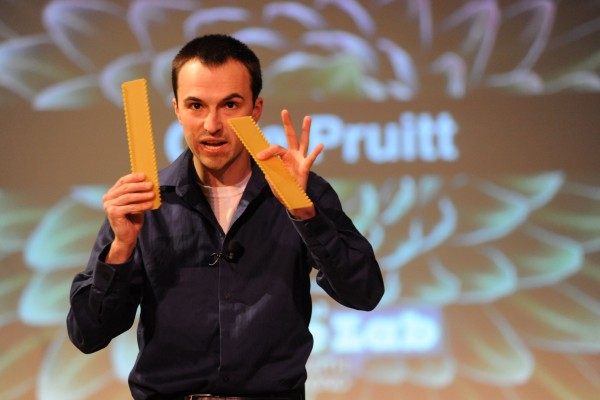Stand-up science
The St. Louis FameLab, a science communication competition sponsored by National Geographic and NASA, recently gave young scientists a chance to present their science to nonscientists in three minutes. Efforts such as this are becoming increasingly common as scientists try to reconnect with the public. Some universities now require three-minute video presentations for every thesis or dissertation — or even for every published journal article.
Scientist helps kids — through turtles — connect with nature
Visiting scientist Stephen Blake has traveled the world trying to protect endangered species, including forest elephants and giant tortoises. Lately he and his wife veterinarian Sharon Deem have put increasing emphasis on trying to restore another endangered species: kids who care about nature. They’ve started the St. Louis Box Turtle Project as a kid-friendly way to re-introduce kids to the woods.
Water on moon topic of 2012 Robert M. Walker Distinguished Lecture Series
Maria Zuber, a professor of geophysics at the Massachusetts Institute of Technology, will deliver the fifth annual Robert M. Walker Distinguished Lecture at 7 p.m. Wednesday, Nov. 14, in Room 100 in Whitaker Hall on the Danforth Campus. During the free, public lectures, she will discuss new information about water on the moon.
Washington University to offer master of science degree for biology teachers
Washington University in St. Louis will offer a master of science in biology degree specifically for in-service teachers through University College, its adult, evening and continuing education division in Arts & Sciences. Faculty created and piloted the degree with 90 biology teachers nationwide as a National Science Foundation teacher institute.
Math, science focus of two-week residential summer camp at WUSTL for St. Louis-area middle schoolers
Washington University is hosting its fourth ExxonMobil Bernard Harris Summer Science Camp June 20-July 2 for 48 middle school students from St. Louis City, County and Metro East schools. The free two-week residential camp offers innovative programs to enhance middle school students’ science and math knowledge. Former NASA astronaut and camp namesake Bernard A. Harris Jr., MD, will visit the campers from 10 a.m. to noon June 30 in Holmes Lounge, Ridgley Hall.
NSF program at WUSTL helps local science teachers become leaders
Through a $631,000 grant from the National Science Foundation’s Robert Noyce Master Teacher Scholarship Program, WUSTL’s Phyllis Balcerzak guides a group of local educators who study teacher leadership. The Noyce fellows collaborate with Balcerzak and other WUSTL faculty monthly. They develop leadership projects through professional organizations and other local school districts. Teachers accepted to the program have master’s degrees and several years of experience. They also receive a stipend for the three-year program.
Summer science camp develops the minds of young Einsteins
If a young Albert Einstein could have picked a summer activity he may have opted to participate in the ExxonMobil Bernard Harris Summer Science Camp at Washington University in St. Louis, June 16-27. An exciting two-week adventure filled with field trips and science experiments, the summer camp proves that math and science can entice a crew of middle school students and lead them to rewarding opportunities.

